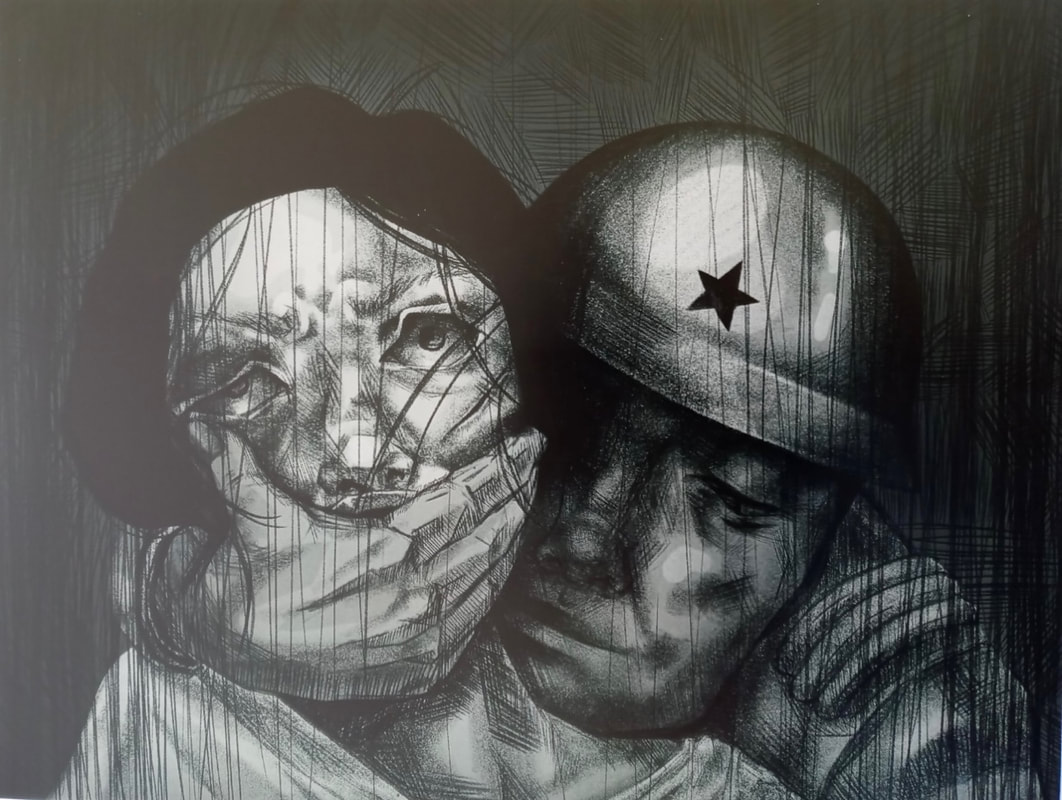Forgotten by Eun Seo Kim, 2021
2021 International Art Competition Autonomy Award recipient
2021 International Art Competition Autonomy Award recipient
Brief Background
In May 2015, the International Committee for Joint Nomination (ICJN) of Documents on the Japanese Military “Comfort Women” submitted an application for the “Voices of the ‘Comfort Women’” to be added to the UNESCO Memory of the World (MOW) Programme. A day or days prior, three right-wing groups in Japan and one group in the U.S. also applied for registration in the UNESCO Memory of the World Programme with six cases that deny the forced nature of the Japanese military sexual slavery system.
Organized in 2015, the ICJN is composed of 14 groups from eight countries—Korea, Japan, China, Taiwan, the Netherlands, the Philippines, Indonesia, and East Timor. The “Voices of the ‘Comfort Women’” is a collection of documents that contain the stories of “comfort women.”
In October 2017, the application was “postponed” pending “dialogue” between the applicants and the Japanese government. The revised criteria state that when an application is contested, applicants need to “talk” through a third party. This revision of pursuing “dialogue” in cases where an application is contested legitimizes the perpetrator’s veto power and amounts to demanding that victims negotiate with perpetrators.
Voices of the "Comfort Women": ICJN website
Voices of the "Comfort Women": The Power Politics Surrounding the UNESCO Documentary Heritage
In May 2015, the International Committee for Joint Nomination (ICJN) of Documents on the Japanese Military “Comfort Women” submitted an application for the “Voices of the ‘Comfort Women’” to be added to the UNESCO Memory of the World (MOW) Programme. A day or days prior, three right-wing groups in Japan and one group in the U.S. also applied for registration in the UNESCO Memory of the World Programme with six cases that deny the forced nature of the Japanese military sexual slavery system.
Organized in 2015, the ICJN is composed of 14 groups from eight countries—Korea, Japan, China, Taiwan, the Netherlands, the Philippines, Indonesia, and East Timor. The “Voices of the ‘Comfort Women’” is a collection of documents that contain the stories of “comfort women.”
In October 2017, the application was “postponed” pending “dialogue” between the applicants and the Japanese government. The revised criteria state that when an application is contested, applicants need to “talk” through a third party. This revision of pursuing “dialogue” in cases where an application is contested legitimizes the perpetrator’s veto power and amounts to demanding that victims negotiate with perpetrators.
Voices of the "Comfort Women": ICJN website
Voices of the "Comfort Women": The Power Politics Surrounding the UNESCO Documentary Heritage
2021 Campaign
The Masan, Changwon and Jinhae Civil Assembly for Japanese Military Sexual Slaves (Machangjin in short), an organization that is actively involved in amplifying the voices of “comfort women” in Pusan, South Korea, hosted two international campaigns in summer 2021 to help the “Voices of the ‘Comfort Women’” to be registered to the UNESCO Memory of the World Programme. The two events are: 1) an International Youth Art Competition and 2) a youth international campaign to raise awareness about registering the “Voices of the ‘Comfort Women’” to the UNESCO Memory of the World Programme.
ESJF co-organized these summer campaigns with organizations in Korea, the U.S., Taiwan (Province of China), and the Philippines.
ESJF co-organized these summer campaigns with organizations in Korea, the U.S., Taiwan (Province of China), and the Philippines.

